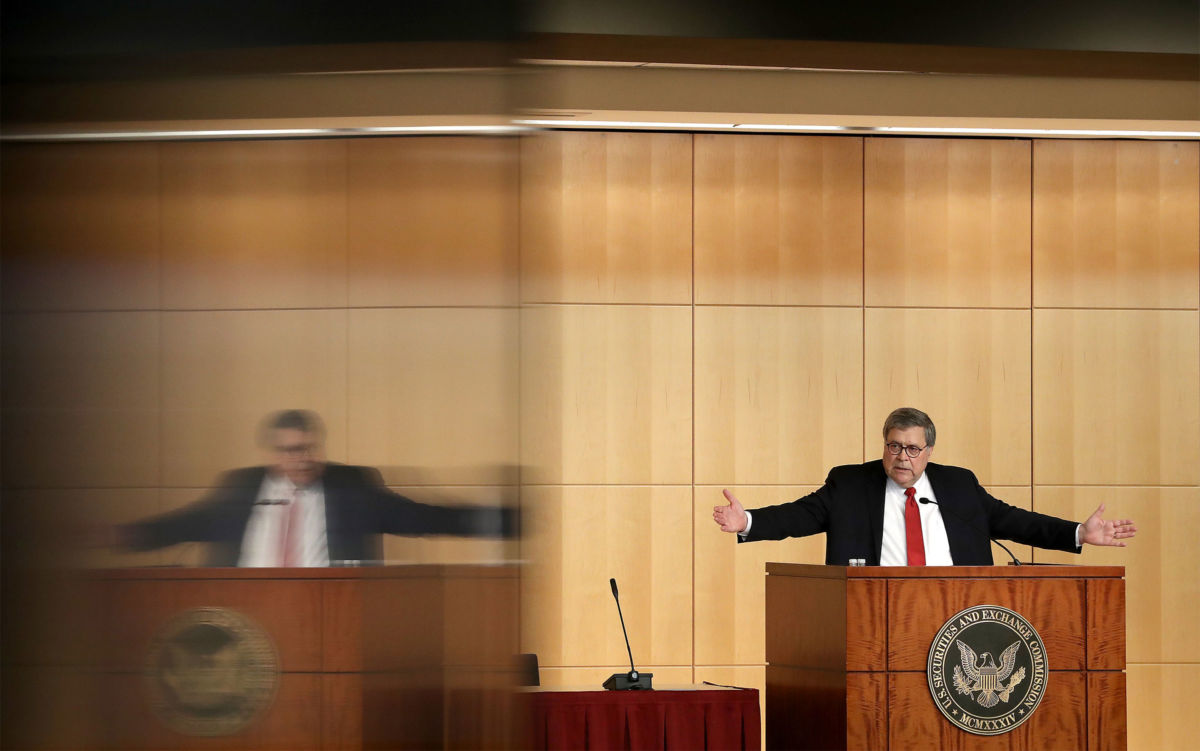With the U.S. Supreme Court poised to decide this month whether it will review a ruling key to the Atlantic Coast Pipeline’s future, majority-owner of the project Dominion Energy has received support in its case from Republican state Attorneys General and the U.S. Department of Justice. Both U.S. Attorney General William Barr and the state Attorneys General have close financial ties to the utility — including through a GOP group that funneled millions to one key proponent.
Barr served on Dominion’s Board of Directors from 2009 until his confirmation as Attorney General in February of this year. In June, U.S. Solicitor General Noel Francisco, who reports to Barr, asked the Supreme Court to revisit an appeals court decision that vacated essential permits for the $7.5 billion Atlantic Coast Pipeline (ACP). A joint venture between Dominion, Duke Energy, Piedmont Natural Gas, and Southern Company, the 600-mile ACP would transport fracked gas from West Virginia to Virginia, North Carolina, and potentially further south.
Between 2009 and 2018, Barr received $2.3 million from Dominion in cash and stock awards, according to a Forbes report based on SEC filings. Upon his resignation from the Board, he received 2,000 shares of common stock, as outlined in his Ethics Agreement, worth about $150,000 at Dominion’s stock price this past spring. Barr was supposed to divest that stock within three months, according to his Ethics Agreement.
Barr has yet to recuse himself publicly from activities relating to the ACP. Supreme Court appeal — as he has in other cases involving his private-sector work — despite committing “not to participate personally or substantially” in matters that could benefit Dominion for one year:
The Department of Justice did not respond to a request for comment on whether Barr had recused himself in relation to the government’s intervention in the ACP case.
State Attorneys General, Backed by Dominion-funded Group, Support Utility in Pipeline Appeal
Dominion’s co-optation of Attorneys General has also manifested at the state level. West Virginia Attorney General Patrick Morrisey led a group of 16 state attorneys general — all Republicans — in a filing this July urging the Supreme Court to take up the ACP appeal. The utility has given $60,725 to a key supporter of Morrisey and other signatories — the Republican Attorneys General Association (RAGA) — since 2014, according to Dominion’s political spending disclosures.
RAGA describes itself as “the only national organization whose mission is electing Republicans to the Office of Attorney General”. Virginia, the primary state in which Dominion operates electric service, has not had a Republican Attorney General since January 2014, suggesting the utility’s recent largesse to RAGA aims to curry favor for other aspects of its operation, like its massive gas pipeline expansion. Dominion nonetheless attempted to recover $8,000 in expenditures to RAGA from Virginia customers in a 2015 rate case.
RAGA poured $6.8 million into Morrisey’s 2016 re-election campaign, and toward ads against his opponent, through the Mountaineers are Always Free PAC that RAGA established the same year, according to an analysis of state campaign finance data by West Virginia Citizens for Clean Elections. It is possible that RAGA or Dominion may have channeled additional resources to Morrisey through other intermediaries. For instance, the Rule of Law Defense Fund has operated as a de facto conduit for conservative dark money groups and anti-climate activities since its founding by RAGA in 2014. However, such 501(c)(4) organizations are not legally required to disclose all donors or recipients.
Press freedom is under attack
As Trump cracks down on political speech, independent media is increasingly necessary.
Truthout produces reporting you won’t see in the mainstream: journalism from the frontlines of global conflict, interviews with grassroots movement leaders, high-quality legal analysis and more.
Our work is possible thanks to reader support. Help Truthout catalyze change and social justice — make a tax-deductible monthly or one-time donation today.
